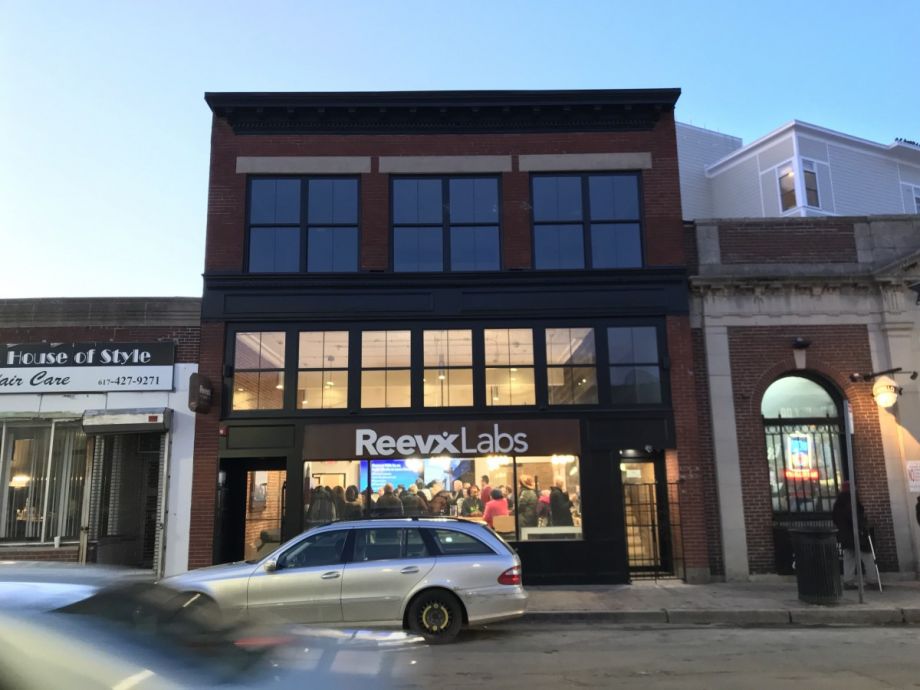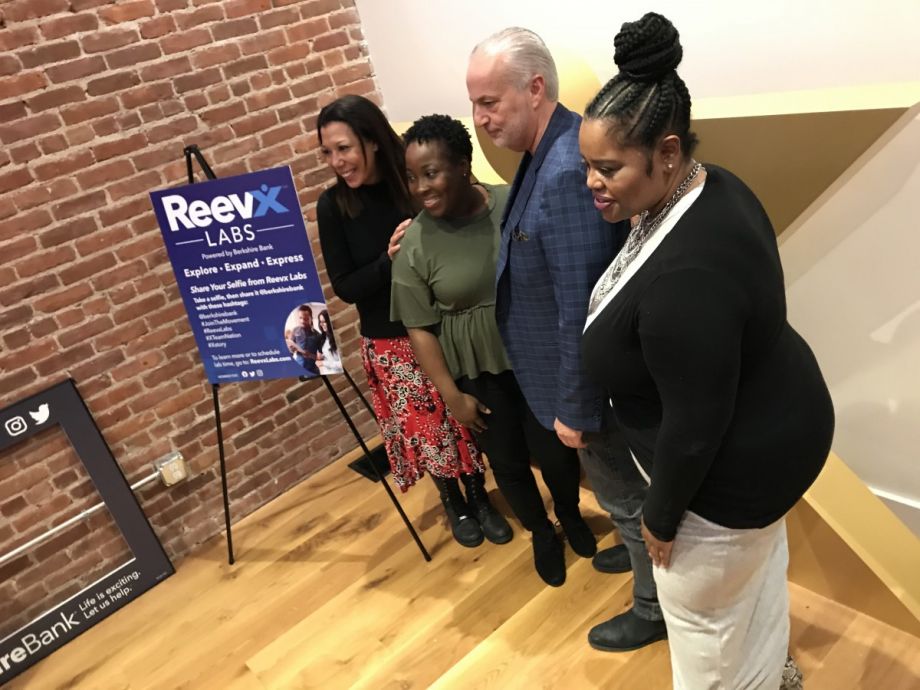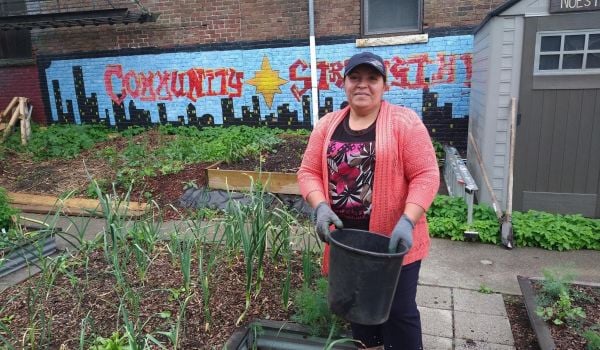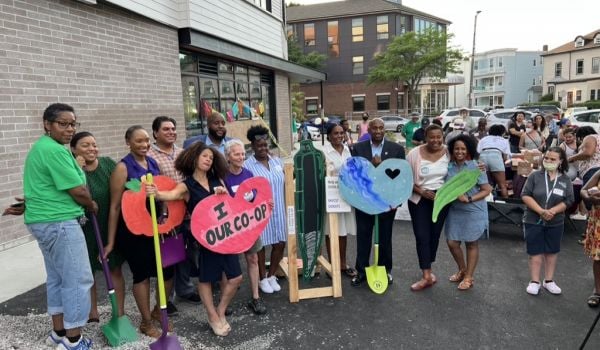Malia Lazu once described herself as “the diva of democracy with my push-up bra and my fabulous boots,” back in the days when she founded and ran MassVOTE, a statewide initiative to close the voter turnout gap between largely white suburbs and urban communities of color. She also wrote a chapter in a book titled “How to Get Stupid White Men Out of Office.”
Lazu never imagined she’d be working at a bank, but she is now Berkshire Bank’s chief experience and culture officer. One of her first projects: helping the bank opening a series of locations that aren’t banks at all, but spaces whose design and purpose are determined in collaboration with underbanked communities.
The first new space, a new coworking and event space in Boston’s Dudley Square, celebrated its grand opening last week. That event brought a who’s who of people and organizations serving Boston’s working-class communities of color.
There was Kerry Bowie, managing partner at Msaada Partners, which runs the Majira Project. The project annually matches six companies serving underserved communities with 16 weeks of pro-bono consulting support from the Boston Consulting Group. Also in the room was Sherina McKinley, until recently the operations & business manager at Commonwealth Kitchen, a commercial kitchen and food business incubator in Dorchester, another predominantly-black neighborhood in Boston.
And there were business owners like Cassandria Campbell, who grew up in the neighborhood and now runs Fresh Food Generation, a catering company that’s currently based at Commonwealth Kitchen and was part of the inaugural Majira Project cohort.
That such a tight-knit community came out to the grand opening for an initiative from a bank that is relatively new to Boston speaks volumes.
“I’m just learning about [Berkshire] as a bank,” Campbell says. “But it makes a difference to me to see them go the extra mile, not only to bring in someone like Malia [Lazu] but also to listen to her. I can walk with that.”
The coworking and event space is just one of several of Berkshire’s planned brick-and-mortar locations that aren’t banks at all. Internally, the bank calls them storefronts, but they could be coworking locations, retail stores, or other possibilities. They’re all branded as Reevx (“Reev-ex”) Labs. Berkshire is planning to open more of them across its seven-state footprint in the Northeast. The storefronts are just one of several initiatives Lazu is shaping from her new position, all oriented toward bridging historic gaps between mainstream banks and communities of color.
Berkshire Bank sees unbanked and underbanked communities as its next opportunity for growth, according to CEO Richard Marotta. At least one out of four households nationwide are unbanked or underbanked, according to the FDIC’s most recent household survey of unbanked and underbanked households, conducted in 2017. The FDIC defines “underbanked” as a household that has at least one bank account but also obtains financial products or services outside of the banking system.
It’s a big shift in the bank’s growth strategy. A decade ago, Berkshire Bank had $2.7 billion in assets and its headquarters in Pittsfield, in western Massachusetts. But then it went on on a buying spree, acquiring about one other bank a year, in upstate New York, Connecticut, Providence, Boston, and New Jersey. It also moved its headquarters to Boston, and today it has $13.5 billion in assets. In 2018, Berkshire Bank CEO Michael Daly stepped down, and Marotta took his place. The new boss made some frank assessments of his bank and who it was serving — as well as who it wasn’t yet serving.
“What became apparent to me is we weren’t really looking and acting like the communities that we served,” Marotta tells Next City. “We didn’t have the product set, we didn’t have the folks who come from those communities.”
There are huge racial disparities in access to banking — an estimated 47 percent of black households are unbanked or underbanked, as well as 43 percent of Latino households, compared with just 17 percent of white households, according to the FDIC survey. And communities of color have good reason to be skeptical of financial institutions, which have often selectively targeted communities of color with predatory loan products.
Marotta realized the bank needed help to reach those households. After asking around in Boston, he found Lazu, who by that time had founded The Urban Labs, a consultancy focused on helping companies better understand changes needed to reach more diverse customers or hire more diverse employees. Some of her previous clients included financial institutions like Eastern Bank, or the Boston Impact Initiative. Marotta brought on The Urban Labs in a consulting capacity. On their third meeting, Marotta says, Lazu took him on what was his first trip around Dorchester and Roxbury, Boston’s two largest predominantly black neighborhoods.
Inspired by other bank’s attempts to re-think how to use their physical spaces, the “storefront” project was one of the first ideas Marotta asked Lazu to work on. He wanted the storefronts out in neighborhoods where the unbanked and underbanked live. With that directive, Lazu went to her network, including Msaada Partners, Commonwealth Kitchens, Boston Ujima Project and others who were already working in those neighborhoods in Boston, and asked them what they needed.
“We don’t want to come in and undercut what’s already happening in the community,” says Lazu, who joined the bank full-time in May 2019. “That’s how we’re looking at going into a place, finding the grassroots economic development center there and seeing how we can, through space, help build whatever they’re building.”
In Boston, Lazu heard from her networks that there was a need for coworking and convening space that could serve the businesses, creatives and entrepreneurs already coming out of the ecosystem in their neighborhoods.
“We will be using the space for meetings,” says Campbell. “Sometimes the kitchen space is hard to get work done. Sometimes you just need support from other people, you need to see other people doing work.”
Lazu says coworking is free for anyone connected to an affiliated organization, including a number of accelerators and incubators such as Commonwealth Kitchens. Registered nonprofits can sign up to use the event space free of charge.

(Photo by Oscar Perry Abello)
There are Reevx Labs locations in the works for Providence, Rhode Island; Springfield, Massachusetts; and Greater Philadelphia. Lazu was also in Brooklyn last December to start surveying for a possible location. Each one, Lazu says, will be customized in close collaboration with organizations already serving historically underbanked communities. Where there are already coworking spaces serving those communities, Reevx Labs might build a pop-up retail space.
“They do range, because we want them to be responsive,” Lazu says. “If it’s not gonna be something the community needs, the community is not going to use it and we’re just wasting our money.”
Each location is not a full-service branch. The reason behind that is partly to make the spaces more approachable for communities suspicious of banks. It’s also partly practical — full branches would require regulatory approval from the FDIC to open or close. Lazu says the flexibility allows the bank to be more responsive as community needs may change over time. It also makes the community purpose the primary purpose of the space, as opposed to the business of banking.
“If you want to sit on a stoop, you need a stoop,” Lazu says. “That’s how you build community.”
That said, the bank is spending money from the part of its budget that it would otherwise spend on branches. It took some convincing internally to see it that way.
“Branches are always loss leaders,” Lazu says. “Branches never make money so why are we asking if we’re okay with this being a loss leader when we’ve never asked that about a branch.”
Berkshire Bank is literally banking on the relationships generated in and around each Reevx Labs to help generate borrower pipelines. It’s with that in mind that Lazu is also working on other areas of the bank to make sure it has the right product fit and internal culture to serve communities it frankly hasn’t served before. The changes go all the way to the top of the bank — which added two black board members in 2019, one from Boston and one from Newark, New Jersey.
In terms of product fit, Lazu also tapped into her deep network to bring a loan product into the bank that has been designed specifically by people of color to meet the needs of entrepreneurs of color — the friends and family loan fund, designed and managed by The Runway Project. Lazu first worked with Runway Project founder Jessica Norwood in their prior lives in politics, including forming the League of Pissed Off Voters PAC.
Runway Project loans offer friendly terms for entrepreneurs of color — up to $20,000, 4 percent interest with an interest-only initial period to keep loan payments low while the business gets off the ground. But more importantly, the loans feature a community underwriting process, where members of the underserved community sit on a credit committee to vet and approve the loans themselves. Credit scores and collateral aren’t factors in their decisions.
McKinley, formerly of Commonwealth Kitchens, is now working for the Runway Project as its local point person in Boston. Each loan will come with one-on-one technical assistance tailored for entrepreneurs of color, both before each loan and for the entire life of each loan. McKinley will coordinate the technical assistance as well as the credit committee approval process.
“We may approve a loan, but we’ll say we want you to work on these areas, and those areas we want you to work on go into your advising plan for the life of your loan,” McKinley says. “So when you’re in that [credit committee] meeting, you’ll be affirmed, you’re gonna get approved, but you’ll also get some things to work on, so it’s like a room of people who are gonna support you because they believe in your business.”
Lazu plans for each Reevx Labs location to have its own Runway Project point person. The local groups connected to each Reevx Labs location are eligible to refer borrowers for the friends and family loans, and a local credit committee for each location will approve the loans, but Berkshire Bank will be the lender of record, allowing borrowers to build a track record of repayments to a mainstream banking institution.
“We thought that it was really important that the community decides whether you get this loan or not, but it’s going to sit on our books,” Lazu says.
Last week’s grand opening also brought out new Boston City Council President Kim Janey. Now representing the surrounding Roxbury neighborhood, Janey is also a founding board member of Lazu’s former MassVOTE.
“You have my full support to everything that is happening here,” Janey remarked at the grand opening. “This neighborhood is the epicenter for the disparities and inequity that we see in our city, but it is the heart of our city.”
EDITOR’S NOTE: We’ve corrected the name of the town in which Berkshire Bank was previously headquartered.
This article is part of The Bottom Line, a series exploring scalable solutions for problems related to affordability, inclusive economic growth and access to capital. Click here to subscribe to our Bottom Line newsletter.

Oscar is Next City's senior economic justice correspondent. He previously served as Next City’s editor from 2018-2019, and was a Next City Equitable Cities Fellow from 2015-2016. Since 2011, Oscar has covered community development finance, community banking, impact investing, economic development, housing and more for media outlets such as Shelterforce, B Magazine, Impact Alpha and Fast Company.
Follow Oscar .(JavaScript must be enabled to view this email address)


















